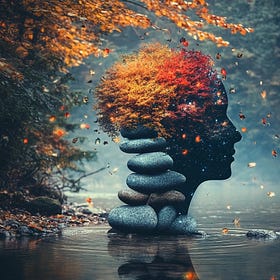When AI Has Better Taste Than You
How machines conquered our skills, infiltrated our aesthetics, and left us with one final advantage
Wittgenstein once wrote that when the eye sees something beautiful, the hand wants to draw it.
This line, from the The History of Love, runs through my mind almost daily. The eye and what it admires is how I think of taste.
Today’s popular opinion is that great taste is a key advantage that humans have over AI. But is this true?
To explore this question, I had a chat with Ivan Zhao, CEO and co-founder of Notion. I was particularly eager to sit down with Ivan both because Notion is one of my favorite products and because he's a founder whose taste I greatly admire. (Case in point: how much I adore everything on this page.)
The below essay weaves together some of the threads of our conversation.
The three elements of human value
In what ways do we contribute to the world?
Ivan posits an elegant framework to the above question that breaks down value into three components:
Our capabilities — these are the skills and knowledge that we possess. Can you build a fire? Calculate the trajectory of a rocket? Craft a website? Determine who stole the cookie among a group of kindergartners?
Our taste — these are our values and preferences. What draws you more: Art Nouveau's organic curves or Bauhaus's clean functionality? Are you moved more by a single person's suffering right in front of you, or by the possible harm that might affect thousands of future generations? Does your focus lean toward an impressive end, or an elegant means?
Our agency — this consists of our will and drive. Even if we know how to do something, will we be sufficiently motivated to do it? Do we care enough to be moved to action?
These three elements work together to determine how we actually contribute: our capabilities define what we can do, our taste guides what we want to do, and our agency determines what we will do.
AI is winning the capabilities race
Every generation has watched technology surpass us in new domains.
First our physical skills were defeated: machines could plow fields, move loads, and spin thread faster and more tirelessly than we ever could.
Then our analytical skills fell: calculators could multiply and derive thousands of numbers in the time it takes you to read this sentence. Algorithms began trading stocks, detecting fraud, and recommending ways to part with your money more effectively than any human brain. One by one, computers defeated our greatest champions of strategic games in chess, go, and even Starcraft.
Now, even our creative skills are under assault. ChatGPT writes a sharper essay than most college graduates. Midjourney creates more professional artwork than many artists. Whether it's code or music, videos or graphics, dozens of startups are ruthlessly competing to demonstrate how AI can produce work that's indistinguishable from what we used to call a marvel.
The most skilled humans today still outcompete AI in complex reasoning and innovation. But as AI grows smarter, its infinite patience and inexhaustible speed will make it even more capable of taking over more and more human lanes.
Taste is a fragile fortress
Today's conventional wisdom is that great taste is one of the last remaining bastions of human superiority. Whereas taste we’ve defined as one's values and preferences, great taste is when one's values and preferences are so refined that they can consistently spot excellence before others see it.
We’ve clung to this driftwood of taste because AI's current attempts at curation feel laughably generic. When AI recommends music, it tends toward safe, billboard-hit choices. When it tells jokes, it recycles material from generations of dads past rather than crack something worthy of a Netflix comedy special.
Perhaps some part of us believes taste is safe from AI dominance because it’s subjective. After all, who can know my values and preferences better than me?
But great taste is more objective than we assume. To be deemed excellent implies social validation; some group of others must affirm the judgment!
If you say a friend has “excellent taste in music,” it’s because you’ve witnessed this friend selecting songs that you and other music-lovers vibe with. In other words, you believe your friend is a damn good predictor of what a discerning audience will appreciate.
This skill isn’t just luck or innate musicality. Your friend is well-informed and I’m willing to bet good money she isn’t the type who only listens to Top 40 stuff.
Tastemakers are voracious students of their discipline, obsessing over details that others might find tedious in their quest to uncover hidden gems. When they say "this song is great," it carries the authority of someone who has evaluated hundreds of similar tracks and can articulate exactly what makes this one distinct. They've built a foundational understanding that lets them discern the craft involved—what was technically challenging, what was innovative, how it connects to broader musical lineages.
Despite experts occasionally butting heads, well-informed communities tend toward consensus on greatness, especially over time. How many designers do you know who strongly feel Windows is better designed than MacOS? How many engineers do you know who sing the praises of C++ or Perl?
If excellent taste operates through pattern recognition across vast cultural knowledge, then it isn’t a stretch to imagine that AI systems can replicate this process. They can absorb the same foundational context the best tastemakers do; they can track the preferences of frontier communities and learn to predict with increasing accuracy what a discerning individual will value. Seen as a prediction engine, human taste is far more vulnerable to AI competition than we'd like to admit.
That said, at the highest echelons, taste is not just prediction, it’s also movement making. The most significant tastemakers take social risks. They might champion work that others find unfamiliar and stake their reputation on bold judgments that initially seem out of touch. The writer Zora Neale Hurston died in obscurity but Alice Walker introduced a new generation to her work during the civil rights movement. The composer Johann Sebastian Bach was considered old-fashioned during his lifetime but recognized as foundational nearly 80 years later when Felix Mendelssohn conducted the first public performance of his work after his death.
In a landscape of shifting cultural winds, these people didn’t just conform to existing preferences but convinced others of entirely new ways of seeing and valuing greatness. This dimension of taste, which requires cultural courage and a willingness to be wrong, may prove more resistant to AI replication than mere pattern recognition.
Agency is the uniquely human moat
If AI can meet or surpass humans in capabilities and taste, what remains distinctly ours?
The answer is agency. The will and motivation to act on our values. Moving the hand to draw what the eye admires.
Even as AI becomes more capable, humans are still the ones to unknot problems that deserve attention. Human drive is what made AI in the first place; it’s what will direct the work of this technology.
We talk of the “agency” of AI systems, but what we mean is letting these systems optimize for some programmed objective. Who sets these objectives? Ultimately it’s still us.
Human agency emerges from our subjective experience of life’s purpose. We choose to play chess not because we're the best at it, but because the struggle of the game matters to us. Sometimes we choose to write so we can better connect with others; other times we write to think or feel. Who can determine the why except the self?
Of course, this raises disorienting questions about the future. Will AI eventually develop its own sense of purpose? Could it one day care about outcomes beyond its programming?
For now, at least, we humans remain the source of intentional choice in the world. We choose what to optimize for and what to preserve. We determine whether technology serves our flourishing or something else entirely. We can opt into making things with our hands instead of with machines.
Our unique agency allows us to exercise a higher plane of creativity to direct our attention. Our specific will is what determines whether we progress toward our vision or slip into chaos.
Whether this advantage lasts depends on questions we're only beginning to understand about consciousness, purpose, and what it means to truly care about something.
But in a world where capabilities and even taste becomes commoditized, the will of the hand to act according to our values may well be our most rare and precious resource.
Other articles in the Looking Glass AI series
Conversational Interfaces: the Good, the Ugly & the Billion-Dollar Opportunity
i. ChatGPT launched from OpenAI on November 30, 2022, and in two short months, broke consumer app records like a bull in a china shop. It felt to many like magic.
Our Souls Need Proof of Work
Dear Readers: I’m starting a series exploring AI and how it might change us — the way we work and learn and relate to the world. There is so much to explore! Expect more frequency of posts going forward.







Makes me realize AI is not smarter than us. Rather, taste-makers as described above start transferring their expertise to AI models, and that is what makes tech smarter than us.
AI doesn’t know more. It has acquired the knowledge of people who have developed the taste and intuition that most of us chose to ignore or reject.
Great article. I found the framework of capabilities, taste and agency as the drivers of value intriguing. I also found it challenging because I think the fundamental driver of value is curiosity, which creates a flywheel of motivation, capabilities and autonomy.
I found myself asking: what is the difference between curiosity, taste and agency? Is curiosity the intersection of taste and agency, insofar as it is the tastes that we are prepared to act on, either by learning or making? As opposed to remaining passive consumers and spectators?
Curiosity is also the original driver of most of our capabilities. So I'm sticking with the curiosity flywheel as the driver of value. But this framework of capabilities, taste and agency adds a lot of depth to how it works.